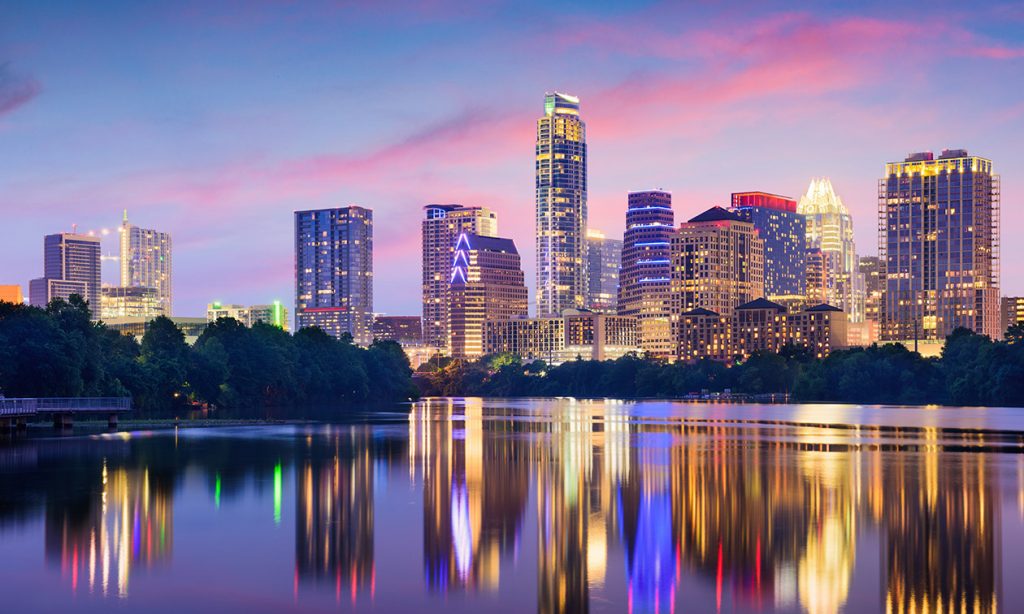From Plans to Progress: Catalyzing Climate Action through the American Cities Climate Challenge

By Kelly Shultz and Anne Emig of the Bloomberg Philanthropies Environment and Government Innovation teams
Last week, the Bloomberg American Cities Climate Challenge brought together more than 100 of the country’s foremost city sustainability leaders for a three-day convening in Austin. Participants represented a robust network of world-class partners, dedicated city officials, and leading policy experts who all share one common goal: fight climate change on a local level to create healthier, more resilient, and more sustainable communities for city residents.
When deciding where to convene the Climate Challenge winners, we couldn’t think of a better location than Austin. Through strategic implementation of programs, and partnership with city departments, the community and private sector, Austin is on track to achieve its near-term community wide carbon emissions reduction target of 22% by 2020. Under Mayor Steve Adler’s leadership, Austin is demonstrating how to turn ambitious long term goals into actual impact on the ground—and that’s what the Climate Challenge is all about!
From deep dives into the nitty-gritty of energy efficiency policy to breakout sessions on the inextricable connection of climate action and equity, the convening sparked what will be one of the key elements of the Climate Challenge: providing the 25 winning cities with skills, knowledge, and peer-to-peer learning opportunities that will help them continue making progress.
Throughout the convening, one thing was abundantly clear: the winning cities are ready to roll up their sleeves and dive into the work. In their applications to be a part of the Climate Challenge, cities submitted detailed plans for how they’re going to reduce carbon emissions in the transportation and building sectors over the next two years. Together these two sectors typically account for over 80% of an American city’s climate pollution.
Now, with an infusion of support from the Climate Challenge and its partners, the winning cities are hitting the ground running. And last week’s convening gave their sustainability directors and department heads a platform to share best practices, engage with their peers from other cities, and learn from experts from partner organizations such as the Natural Resources Defense Council, Delivery Associates, the Institute for Market Transformation, National Association of Transpiration Officials, World Resources Institute, Rocky Mountain Institute and more.
The convening also provided a look at the early successes that the Climate Challenge winners already have under their belt. These include everything from San Diego’s recent move to promote low-carbon transportation, to Columbus’ launch of the Community Energy Savers program, which is working in tandem with local utilities to increase energy efficiency and lower residents’ energy bills. These examples and more represent what’s possible when cities put their ambitious climate plans into action.
And, while not every city has the same problems or the same solutions, each achievement made or obstacle met within the Climate Challenge can be a lesson learned to develop even better answers to the challenges cities face.
“Mayors understand inherently that the same kinds of actions that will cut carbon pollution – like building new, clean transit choices to help people get out of traffic – also just make their cities a better, stronger place,” said Amanda Eaken, the Director of Transportation for the American Cities Climate Challenge at the Natural Resources Defense Council, during the convening. “So, it’s been wonderful to see mayor after mayor step up and say ‘We are still in the Paris Climate Agreement.’ And this Climate Challenge is designed to help those mayors accelerate progress on their commitments.”
The work of these cities is more important than ever. At a time when the need to act on climate change has never been more urgent, the American Cities Climate Challenge winners are leading the way with innovative solutions and showing how cities across the country – and the world – can make their climate commitments a reality. Michael R. Bloomberg announced earlier this year that the policies pursued through the American Cities Climate Challenge are projected to result in a total carbon emission reduction of 40 million metric tons by 2025. This is equivalent to shuttering 10 coal-fired power plants or taking 8.5 million cars off the road for one year.
But the benefits will spread even beyond the 25 winning cities. As this week’s convening showed, the potential to make progress multiplies greatly when cities collaborate with and learn from one another. And through the American Cities Climate Challenge, 25 cities will provide a roadmap not just for each other, but for all cities who are looking to act on climate.